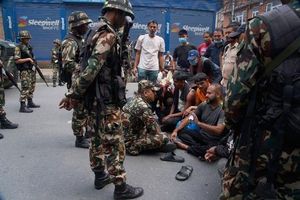People pose for a photo with the Baku Olympic Stadium in the background at the COP29 U.N. Climate Summit, Thursday, Nov. 14, 2024, in Baku, Azerbaijan. Distressingly, as the negotiations approach their denouement, serious impasses remain evident among the 196 nations gathered here, each struggling to converge on new funding measures intended to bolster climate resilience for developing nations.
A recent report by a U.N.-backed expert group emphasized the need for at least $1.3 trillion annually by 2035 to assist countries like the Philippines mitigate climate impacts and transition to greener energy. This pivotal effort builds upon the previous annual commitment of $100 billion which is set to expire by 2025.
UN Climate Change Executive Secretary Simon Stiell emphasized during Tuesday's press conference, "Climate finance is not charity. It is 100 percent in every nation’s interest to protect their economies and people from rampant climate impacts." This aligns with sentiments echoed by Philippine Environment Secretary Maria Antonia Yulo-Loyzaga, who leads her country’s delegation at COP29. She voiced her cautious optimism about the outcomes of these discussions but stressed the pressing need for substantial funding adjustments, especially for adaptation and loss and damage mechanisms.
The urgency of the discussions has been amplified as developing nations find themselves grappling with extreme weather events, many of which have escalated due to climate change. According to the United Nations Environment Programme, the current financial gap for adaptation attempts is staggering, estimated between $187 billion to $359 billion per year. This deficit could significantly hamper efforts to avert catastrophic climate effects.
“We need to secure a new climate finance goal at COP29 as climate is already devastating communities across the world, particularly the most poor and vulnerable,” remarked UNEP’s Executive Director, Ingret Andersen. She, along with others, presses delegates to solidify their agreements on financing measures as negotiators work on the “COP29 package.” This package aims for comprehensive agreements around mitigation, finance, adaptation, gender inclusivity, and human rights.
Outside the conference hall, indignation among activists is palpable as they demand more ambitious financial targets. Lidy Nacpil, the coordinator for the Asian Peoples’ Movement on Debt and Development, voiced frustration over the financial negotiations. “The sticky issue of money affects all other negotiations on emissions reduction and loss and damage mechanisms”, she declared, emphasizing the hesitancy of developing countries to commit to agreements without corresponding financial support.
People from various nations have experienced the brunt of climate change—Philippines native Rodne Galicha poignantly stated, "The growing costs the Philippines incurs due to extreme weather events clearly indicate we need justice-anchored financial, technological, and capacity building support from richer countries to survive this climate emergency.”
Yet even as discussions continue, some experts echo this sentiment of despair within the negotiating framework. Naderev “Yeb” Saño, the executive director of Greenpeace Southeast Asia, stated, “We cannot accept anything less than concrete and ambitious commitments here. The loss and damage fund must be firmly established.”
For many nations, past experiences shape their doubts. The failure of rich countries to fulfill earlier financial pledges adds weight to growing skepticism. Countries like India have boldly stated their financial needs, claiming they alone would require $100 billion annually for their transitions over the coming years. A recent declaration by Brazil, China, South Africa, and others demands the wealthy nations escalate their financing to trillions annually.
Concerns about global cooperation have intensified as the Biden administration continues to pursue climate frameworks, contrasting against the potential shift if Donald Trump returns to higher office. Trump had previously withdrawn the U.S. from the Paris Agreement. Calls for equitable climate funding sparked protests, with activists visibly engaging not just with annual figures, but also with the broader ramifications of climate policies.
Some even speculate the summit may mirror earlier sessions marked by unrealized promises. Bjorn Lomborg, known for his contrarian views, argues the lofty financial projections discussed at COP29, including compensation claims for loss and damages, divert focus from practical solutions like energy innovation and green technologies. He suggests, “Spending tens of billions annually on low-CO2 research will lead to significant long-term payouts, driving greener energy prices below those of fossil fuels.”
This multifaceted discussion of finance and accountability underscored the persistent divisions festering since the COP began, with wealthier nations articulately critiquing poorer states’ reliance on fossil fuels for economic growth. It highlights the complex balance between systemic change and the immediate needs confronting vulnerable communities.
The COP29 conference, which spans until November 22, stands as pivotal for establishing the financial frameworks and commitments necessary to tackle the impending climate challenges. Both sides of the climate conversation urgently acknowledge the dire need for immediate action, yet the vast divide on how to achieve these aims continues to bog down negotiations.
While discussions on substantive climate action have been overshadowed by financial deliberations at COP29, the consensus remains clear: urgent action must be taken. Future paths forward will reveal whether nations can bridge these divides to secure the funding necessary for adaptation and mitigation or fall prey to the cyclical patterns of political ineffectiveness.



